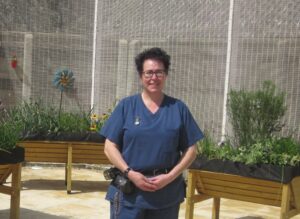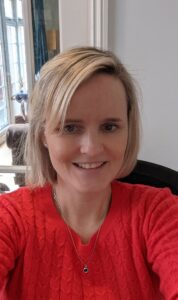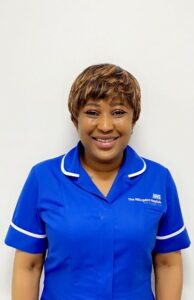“We all want to make a difference” – The NHS in the East of England celebrates International Nurses’ Day
“Being a nurse is a great privilege and I feel blessed to be in a profession that allows me to provide excellent patient-centred care” – on International Nurses’ Day, NHS East of England is taking time to reflect on the contributions of nursing staff over the past year and celebrate the difference nursing staff make to people’s lives every single day.
More than 30,000 nurses and health visitors work across the east of England, providing cradle-to-grave care to more than six million people in the region.
Catherine Morgan, chief nurse for the NHS in the East of England, has taken the opportunity to pay tribute to nursing staff across the region: “Nurses play an integral role in the care of millions of patients every year.
“Nursing is a true calling and having worked in the NHS for 30 years, it’s been a privilege to work alongside the awe-inspiring nurses in the east of England.
“I want to personally thank all of our fantastic nurses who, with their expertise and unending compassion, make an extraordinary impact on the lives of so many.”
Maria O’Neill – the dedicated

Nursing care, although associated with hospitals and traditional healthcare settings, takes place in a wide range of environments. Maria O’Neill, who has been a nurse for 36 years, now works in prisons in the east of England and says moving into prison care is one of the best decisions she has ever made.
Research shows that prisoners are more likely to smoke, misuse drugs and alcohol, suffer mental health problems, self-harm and die prematurely, so the role of a prison nurse is a constant challenge, but one Maria relishes.
Maria says: “When I saw the opportunity to work in prisons and care for people in secured services, I took it, and I’ve now decided I want to work here until I retire.
“You never know what to expect, it’s a little bit like A&E. We have collapses, heart attacks, a whole array of illnesses, so no two days are the same.”
Maria also receives training and development to ensure she can deliver specialist care to her patients. She is qualified to deliver cancer and end of life care, having completed a degree in palliative care in 2007. More recently in 2017, she graduated from Warwick University with a degree in diabetes care and became a Queen’s Nurse, a title given to nurses who have demonstrated a high level of commitment to nursing.
On nursing in prisons, Maria says: “I’m not here to be a judge and jury, I’m here to care for my patients. For nursing in general, we all want to make a difference.”
Jerome Alagao – the educator

On-the-job development has traditionally been one of the reasons many people take up nursing. Jerome Alagao, lead practice educator at East and North Hertfordshire NHS Trust, is one of those that provides support and clinical training to nurses.
Jerome moved thousands of miles from his home in the Philippines to join the NHS as an endoscopy nurse before joining the nurse education department.
He primarily oversees the team who support pre-registration student nurses, apprentices, and newly qualified staff, be that with helping them settle into their new workplace or helping them with clinical questions.
Jerome says: “We have a big job for a small team but taking this role remains one of the best decisions I’ve made in my nursing career.
“I love how I can support student nurses with their progress and how personally that helps me develop my people skills, which are vital in my role.”
Providing education to nurses is a continuous task for Jerome. He states: “There is always more work to be done, and I remain immensely committed to going above and beyond”
Pam Grandison – the specialist

With advances in nursing and medical practice and the need to meet increasing clinical demands, new nursing specialities have emerged in recent times.
Pam Grandison, originally from Belfast, has been a nurse for 25 years and now finds herself as a complex case manager for East and North Hertfordshire Clinical Commissioning Group, specialising in patients with brain and spinal cord injuries, as well as those with complex neurological conditions.
Having worked as a staff nurse in Scotland, Pam moved to Hertfordshire in 2012 and now sees to patients with life-changing injuries, supporting them and their families with referrals and discharges, and undertaking health needs assessments. All of which usually involves liaising with families, local authorities, hospitals, and clinicians.
She said: “The thing that brings me most joy in my work is when a person I have supported manages to return to their own home following a period in rehabilitation or moves to an onward placement that offers them a much improved quality of life.
“I became a nurse primarily to try to make life better for people who find themselves in a very difficult, often bewildering situation.
“To be able to help alleviate that in some way, maybe by signposting to help that is available or supporting a smooth discharge or just by being on the end of the phone to chat to a husband, wife or parent is still the most important part of my job and the reason I love nursing.”
Theresah Ofosu – the resilient

Theresah Ofosu is a newly qualified nurse originally from Ghana. Having moved to the east of England in 2011, Theresah took up a role as a healthcare support worker in care homes and hospitals and it was there she realised her passion for providing care.
Theresah began her Masters degree in adult nursing at the University of Hertfordshire in September 2019 before joining Royal Papworth Hospital as a critical care nurse.
On nursing during the pandemic, she said: “Being a student nurse during the Covid-19 pandemic was a frightening and unprecedented challenge, but I had to stay resilient and not give up on what I loved.
“I conditioned myself to stay strong, and personally found strength in my spiritual faith. This helped me to provide compassionate care to all of my patients and their loved ones during what was an immensely challenging time.”
Having already gained nursing experience in the critical care unit, Theresah has now moved on to working in the outpatient department at The Hillingdon Hospitals NHS Foundation Trust in London and feels a great sense of pride in our career development.
She said: “Being a nurse is a great privilege and I feel blessed to be in a profession that allows me to provide excellent patient-centred care.”
